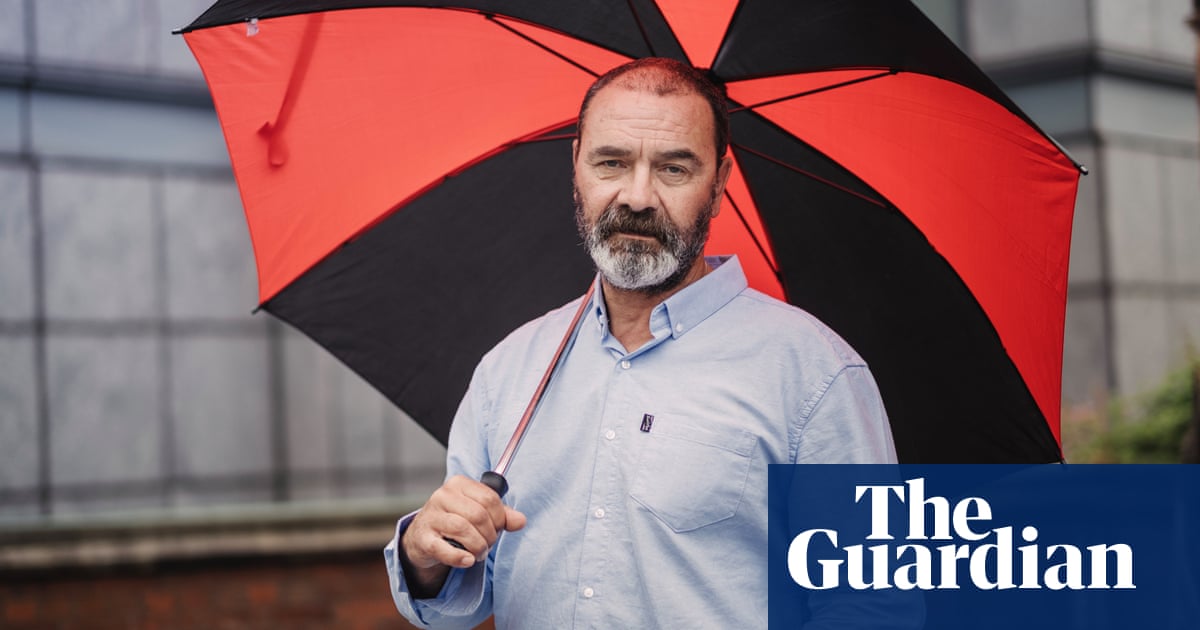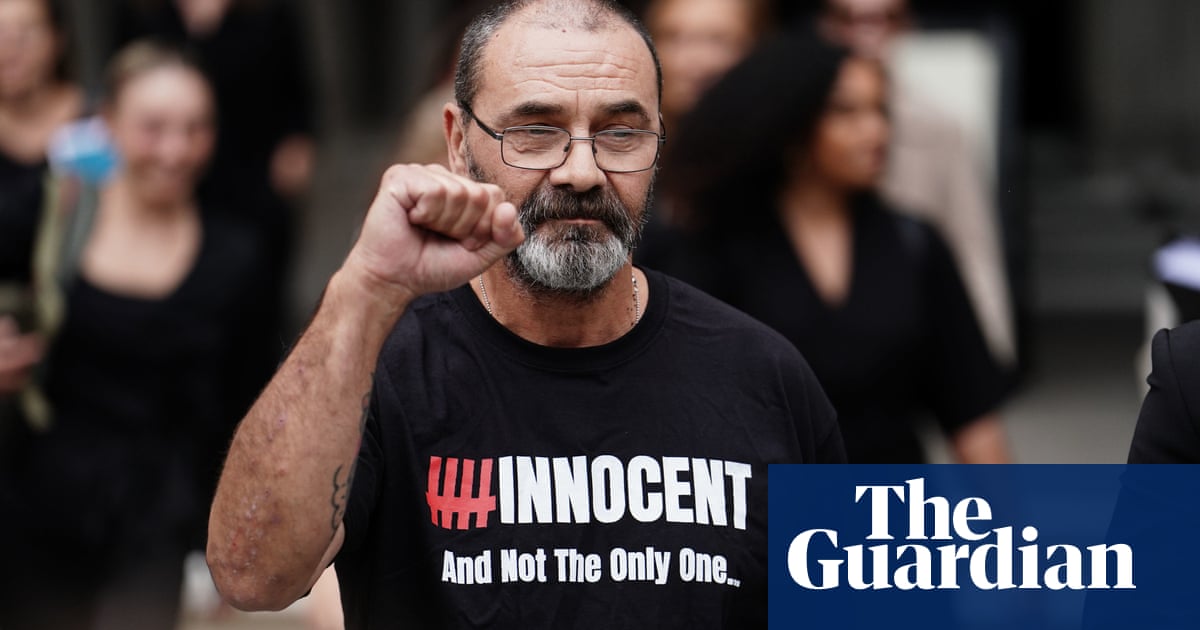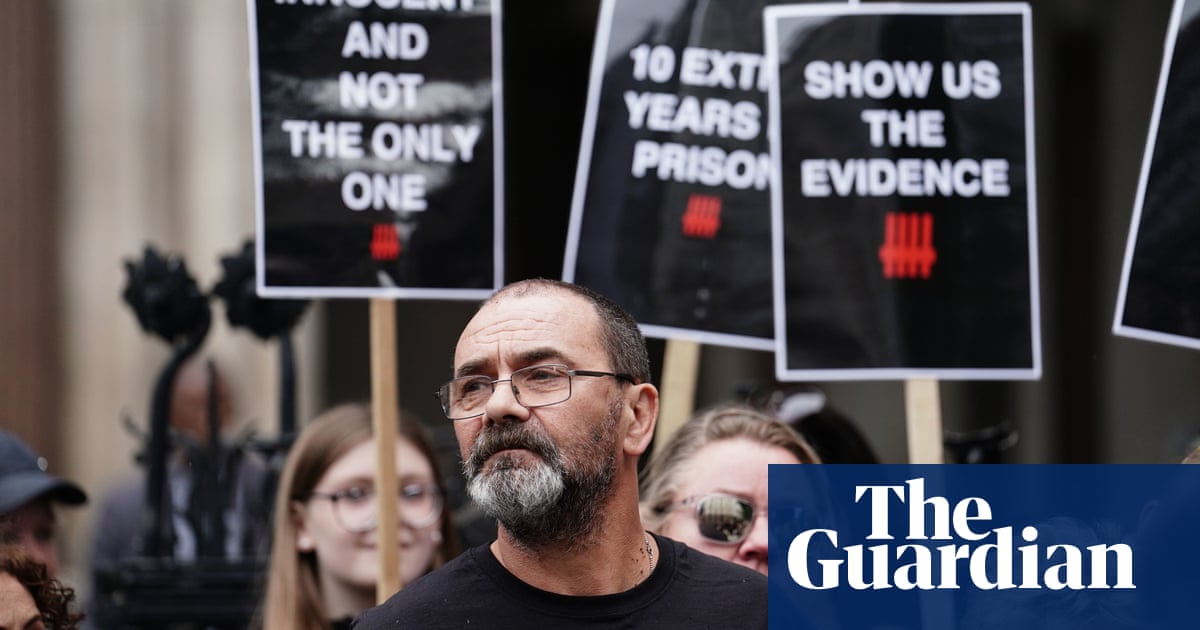
A report on the Criminal Cases Review Commission’s handling of the Andrew Malkinson case has laid bare “a catalogue of failures”, finding that he could have been exonerated almost a decade earlier.
The review by Chris Henley KC found that the watchdog missed multiple opportunities to help Malkinson, who spent 17 years in jail for a 2003 stranger rape he did not commit.
The CCRC is the gatekeeper to any case being reconsidered by the court of appeal in England, Wales and Northern Ireland and is tasked with investigating miscarriages of justice.
Case files show that even in 2022 it was minded to turn down Malkinson’s latest appeal if an alternative suspect was not found, which Henley said showed it was still taking “too cautious an approach”, which needed “urgently to change”.
The new justice secretary, Shabana Mahmood, said she was seeking the removal of its chair, Helen Pitcher, in light of the findings. “It was sobering to read Chris Henley KC’s findings. My thoughts are with both Andrew Malkinson and the victim of this horrific crime.
“Having studied Chris Henley’s report closely, it is my firm view that Helen Pitcher is unfit to fulfil her duties as chair of the CCRC. I have therefore begun the process to seek her removal from that position.”
Henley said the discovery in 2007 of searchable male DNA on the victim’s vest that did not belong to Malkinson was “not properly understood” by the CCRC. There was never any DNA linking Malkinson to the crime and the report said staff needed more training to make sure they understood forensics.
Writing for the Guardian, Malkinson said the discovery of how close his case had come to being refused in 2022 “shook me to my core”. It was this application that eventually led to his conviction being overturned in 2023.
“I did not believe I could get any angrier about what has been done to me, but reading Mr Henley’s findings incensed me,” he wrote. “The truth is that there is something deeply wrong at the CCRC and nothing less than a complete overhaul is needed.”
Malkinson applied three times to the body before it made a referral to the court of appeal. The CCRC did not examine the original police file in any of the three applications and only conducted further forensic testing in the final application after his lawyers showed the results of their own tests.
Malkinson said he was encouraged that the justice secretary wanted Pitcher to go. “Pitcher and her discredited and incompetent senior leadership team should now be replaced with people with a track record of fighting injustice without fear or favour. Survivors of wrongful conviction like me and the sub-postmasters should have input into the recruitment process.”
Because the CCRC is an independent body, unless Pitcher resigns she can only be removed from her post by the king, acting on the recommendations of a panel. This will now be convened.
The CCRC was keen to highlight Henley’s observation that his findings were “necessarily limited to” Malkinson’s case.
However, Henley told the Guardian that “it would be worryingly complacent simply to pass this off as an isolated case”. He said: “Since delivery of the first draft of my report at the end of January, neither the chair nor chief executive has asked to speak to me about my findings.”
Pitcher faced repeated calls to apologise and hand back her OBE when Malkinson was exonerated last summer, given the part the CCRC had played in prolonging his time in jail.
Henley said criticism of the organisation’s “failure to apologise” last year was “well founded”. He wrote: “There should be a wholehearted apology made by the CCRC to Mr Malkinson. The CCRC failed him.”
Pitcher issued an “unreserved apology” only in April when she received the final report, which included Henley’s blunt demand that she say sorry. Henley also said Pitcher had “claimed too much credit” for Malkinson’s exoneration and “took too little responsibility for the mistakes” in statements released last year.
In Malkinson’s most recent application to the CCRC, his team at the legal charity Appeal uncovered significant new evidence pointing to his innocence, including major disclosure failures and more forensic evidence. The court of appeal later concluded that the disclosure failings alone would have made his conviction unsafe.
Despite this, Henley said case notes in 2022 had suggested that the CCRC was “on the verge of repeating the error that no referral [to the appeal court] could be made unless the unknown DNA donor could be identified”.
Henley said staff should all be trained in understanding the threshold needed to refer cases to the court of appeal so that the mistake was not repeated.
He said: “It concerns me that if the new DNA evidence had not been obtained and only the disclosure failures … had come to light, the CCRC would not have made the referral. This suggests that the test [for referral] even now is not being applied properly, and that the CCRC is taking too cautious an approach. This needs urgently to change.”
James Burley, who led Appeal’s investigation into Malkinson’s case, said the report was “utterly damning” and detailed “a catalogue of failures by the CCRC”.
He said: “No one can doubt now that the CCRC is a broken safety net which sets the bar unreasonably high for innocent prisoners trying to clear their names. The CCRC must be completely overhauled.”
The review also questioned if there was a “cultural reluctance to ask for police files”, given that in all three of Malkinson’s applications the original police file was not examined. Had it been, the CCRC could have seen the multiple disclosure failures uncovered by Malkinson’s lawyers at Appeal.
The jury in Malkinson’s trial did not know the extensive criminal history of two key identification witnesses and did not see a key photograph. Henley said the case showed “it is dangerous to assume that everything that the police should provide to the CPS will have been provided”.
Henley also criticised the CCRC for failing to uncover the disclosure issues in the police file that Malkinson’s lawyers were only able to access after legal action. “The body charged with investigating potential miscarriages of justice, with statutory powers to obtain relevant material, had failed to discover them during the course of the first two reviews. This should have been the cause of reflection within the CCRC, and an expression of regret and apology.”
Henley’s criticism extended to the wider justice system, which will face further scrutiny when a government-commissioned inquiry into the case led by the judge Sarah Munro KC concludes.
Henley said the case “demonstrates a deep-seated, system-wide, cultural reluctance, which starts right at the top in the court of appeal, to acknowledge our criminal justice system will on occasion make mistakes, that entirely innocent defendants will sometimes be convicted, and have this possibility at the forefront of our collective mind when trying and reviewing cases”.
Henley also said the CCRC was in urgent need of more resources because of the “formidable challenges” it faced, including a significant rise in applications and a real-terms decline in budget. In 2023-24 it received a record 1,629 applications and has it asked for a 15% budget increase.
“I am in no doubt that whilst the quality of decision-making is different to the issue of resources, the CCRC is hugely underfunded,” Henley said. He said delays in first allocating the case, “the very limited oversight” and “concern about the financial implications of certain decisions” were all examples of “the consequences of inadequate resources”.
Responding to the report, the CCRC said it would “learn from the mistakes that were made” and that work to address Henley’s recommendations had already started.
It said: “We have referred 839 cases for appeal, and the court of appeal criminal division has often commended our investigative work and analysis … Against that background, we deeply regret that our analysis and handling of Mr Malkinson’s case did not meet the standards we set for ourselves and which applicants are entitled to expect, and we offer our wholehearted and unreserved apologies to Mr Malkinson.”












